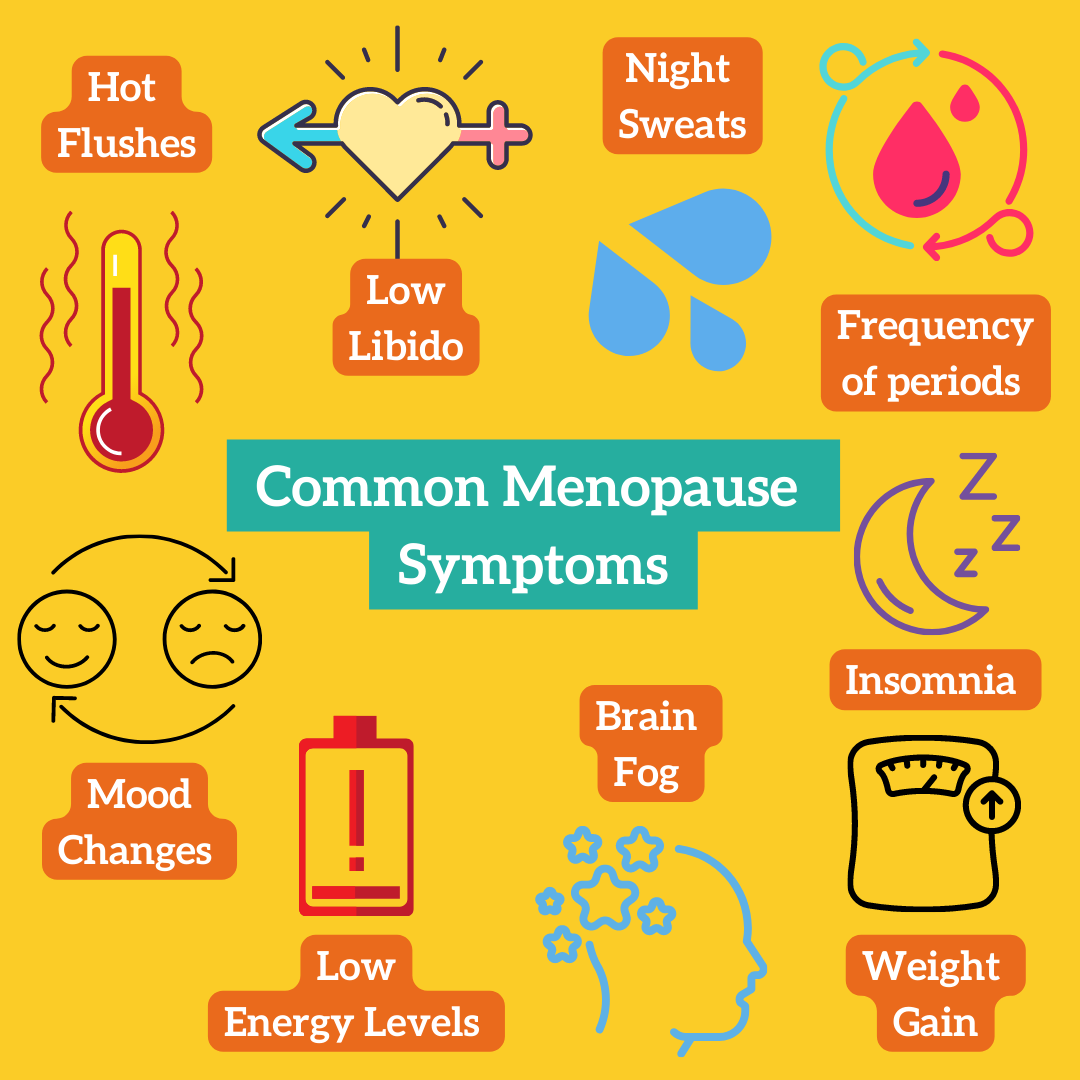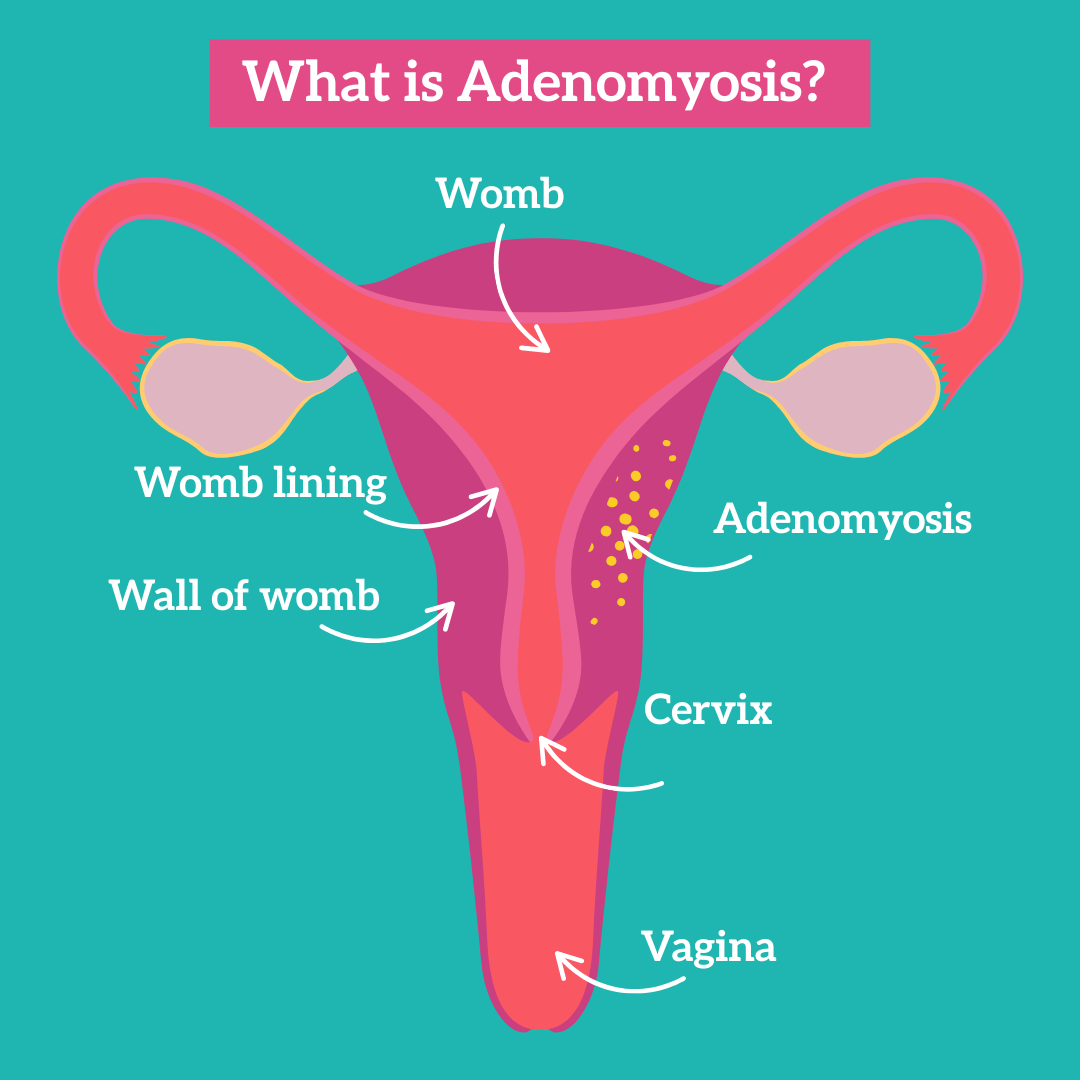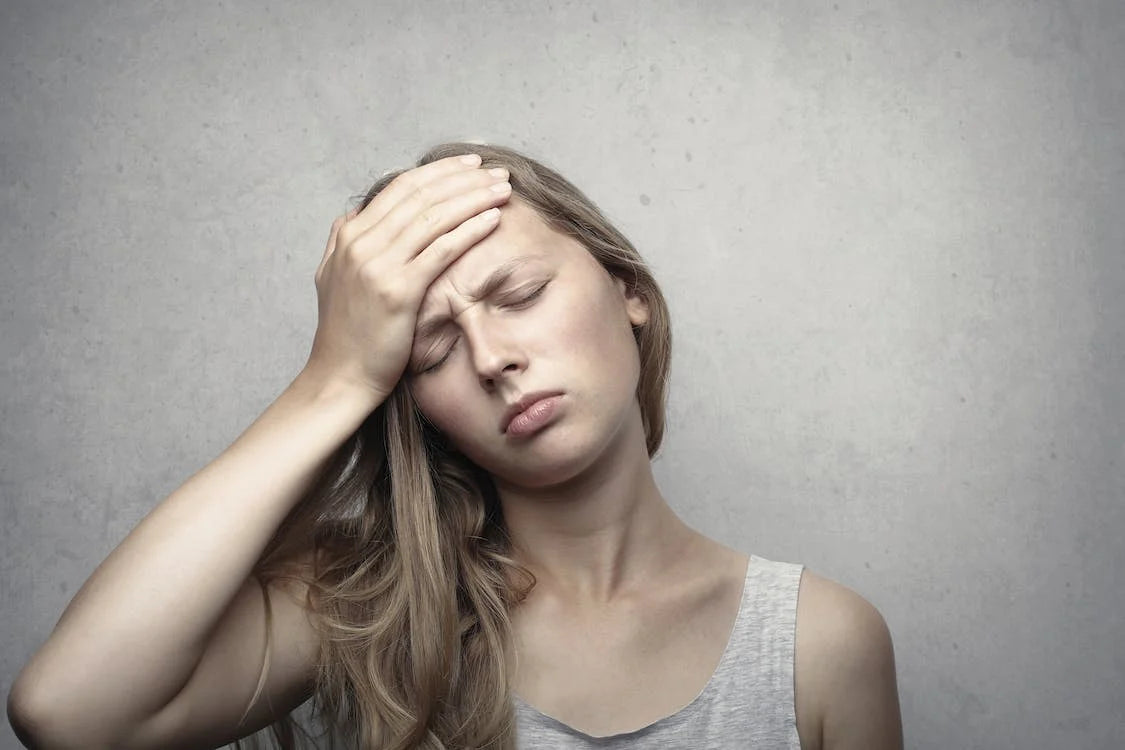48 Symptoms Of Menopause

The 48 symptoms of menopause
Menopause affects everyone differently, and as a result, the range and severity of symptoms vary for each person going through perimenopause. No one's journey will be the same.
However, knowledge is power and being familiar with the most common symptoms is important. We've put the 48 most researched symptoms below, in the hope that changing hormones in your 40s and 50s don't take you by surprise.
But it's important to stress that your doctor can support you if any of these symptoms are severe. HRT and natural, lifestyle and diet changes can support you. There may not be one miracle cure, but you don't need to suffer unnecessarily.
Irregular periods
The average age that a person's last period happens is 51. But 8 out of 10 women suffer from irregular periods throughout perimenopause. Periods can be irregular, and often heavier or lighter.
This is due to levels of estrogen and progesterone that regulate the menstrual cycle fluctuating like mad. It can even mean that you can have a menstural cylce with no period.
Hot flushes
The most commonly known menopause symptom are hot flushes. And it is the number one reported symptom of menopause with 75% of women suffering.
Hot flushes are caused by hormone levels restricting our bodies's ability to regulate temperature. Being sweaty and red when you don't want to be, is a huge issue for many women though, particularly at work.
Reducing caffeine and alcohol is recommended to ease hot flushes - as high alcohol and caffeine consumption has been shown to worsen hot flushes. You can drink iced drinks too, and cool food, wearing loose, cotton clothing.
Our Take A Pause menopause tea has liquorice and sage as key ingredients, which are also linked in small scale studies to reducing the length and severity of hot flushes.
Night sweats
Hot flushes at night time can cause night sweats, making this symptom the 2nd most reported issue in menopause.
Alongside HRT, light, cotton clothes and bed clothes, a fan by your bed and a cold drink by your bed, can also help. Also stopping drinking caffeine earlier in the day may help as a possible trigger.
Tiredness and fatigue
Perimenopause can be signified by feeling 'flat' and down. It's extremely common to feel exhausted as your hormone levels change.
Looking at diet and lifestyle - exercising early in the day to try to boost energy, heading to bed earlier, and making sure you have lots of B vitamins in your diet can all try to help.
Night Owl tea has been specially blended with calming herbs soothe your soul. With natural, organic botanicals that have been used for millennia to support sleep, it really is a hug in a mug.
Bloating/Water retention
Swollen tummies are common during menopause, as hormone changes lead our bodies to store more water in our extremities causing puffiness.
You should look to reduce salt in your diet, and aim to increase potassium. Alongside reducing stress this can really help.
Over The Moon, our cycle support blend can help with bloated as it contains dandelion root, traditionally used to reduce bloating.
Vaginal dryness
Vaginal dryness is the 4th most common menopause symptom, so whilst it may feel embarrassing, it is nothing to be ashamed off. It is caused by a lack of estrogen.
Lubricants can help, talking openly about the issue and seeking help from your doctor is key. You don't need to have an unhappy sex life.
Altered skin
You may experience the sensation of small electric shocks on your skin, as though you have had a static charge from rubbing a balloon on your head. This is due to the fluctuation of Oestrogen in your body, which sends different signals from your brain to your body as the levels fluctuate.
Acne
It’s estimated that a quarter of women in their forties and 15% of women aged 50 or older suffer from problem skin. So just like during puberty, hormonal fluctuations are mainly to blame.
Changes in skin texture
Studies show that women's skin loses about 30% of its collagen during the first five years of menopause. After that, the decline is more gradual with 2% sloping off every year for the next 20 years.
This will result in your skin becoming drier and you will notice more lines, and less firmness in the skin around your jawline, cheeks and neck.
Low libido
Lower testosterone and estrogen can lead to a lower sex drive. Daily gentle exercise and a healthy diet can help support libido.
Mood swings
Sometimes called 'meno-rage', mood swings can be a huge part of menopause. It can lead to women feeling a huge amount of guilt, but it is driven by our hormones - like being a teenager in reverse.
Depression
Following on from the above, menopausal changes to our bodies can lead to a low mood. Researchers have also found that women entering the menopause can be more prone to seeing increases in levels of a brain protein — Monoamine Oxidase A — which is linked to depression.
Mild exercise and a healthy diet all play a part in helping to prevent low mood. Seeking professional help is recommended if your depression is prolonged and severe.
Headaches
Migraines can be crippling in menopause as hormone headaches are very real. Stay hydrated and take time out of stressful situations when you need to.
Weight gain
It can be hard to lose weight in your 40s and 50s due to the change in hormone balance. Diet and exercise are key, but also be kind to yourself - your weight doesn't dictate your worth.
Sore/tender breasts
Changing hormones can lead to sore and tender breasts, just like when you're on your period.
Burning mouth
A burning mouth is a lesser known but awful side effect of menopause. Avoid spicy food and try to get creamy, cooling foods and drinks to help.
Bone and teeth strength
Your whole body, including your mouth, gets drier as your oestrogen levels drop. Bacteria love breeding in this parched environment, which can result in tooth decay and bleeding or receding gums
Dizziness
Some research has suggested that the hormones which play a part in balancing our blood sugar levels, fluctuate during perimenopause affecting the body’s response to insulin, which can in turn lead to dizziness.
Try to stay hydrated to help with this symptom, reducing caffeine and trying alternatives may help alongside reducing stress.
Bladder Weakness
Low estrogen is responsible for this. Regular trips to the loo aren't uncommon and you don't need to be ashamed of this.
Again it is worth cutting down on caffeine, and carbonated drinks as they can irritate the bladder.
Thinning hair
A decline in progesterone and estrogen causes hair follicles to loosen. It can be a huge issue, but modern shampoos, diet and HRT can help.
Trouble concentrating
Oestrogen in particular encourages blood flow to the brain so, if there’s not enough of it about, it’s unlikely you’ll be able to focus at your best. If you are also having trouble sleeping this will impact your ability to concentrate.
Loss of confidence
Many of the symptoms of menopause can contribute to the loss of confidence. But equally changes to your family situation, life events, relationships and work, can also have an impact.
Muscle tension
Muscle aches are caused by changes in levels of oestrogen and progesterone.
Progesterone has a calming effect on the body and mind, so when it dips everything gets tenser. This can go hand in hand with feeling more anxious.
When oestrogen levels drop, cortisol levels can rise which results in higher levels of stress, and can also raise blood pressure and blood sugar. All of which can cause muscle tension.
Recurrent UTI's
Hormonal changes can thin the lining of the urethra, the tube that takes urine from the bladder and out of your body, making it more prone to infection.
Panic disorders
Again changing or imbalanced hormones are to blame. Oestrogen and progesterone usually work together to regulate mood, as they drop off/fluctuate during midlife women are more at risk of developing anxiety. This anxiety can be overwhelming and develop into panic attacks.
Sagging breasts
Before you go from perimenopause into the menopause, your oestrogen levels drop dramatically. This causes your reproductive systems, including our ability to produce milk, to start to shut down, which shrinks the glandular tissue in your breasts.
This change, combined with depleting collagen production due to the ageing process, can cause your breasts to sag.
Worsening PMS
The fluctuation of progesterone can lead to experiencing an intensified version of their average premenstrual symptoms.
Dry Eyes
Unusual but not that uncommon, dryness links to your body being unable to control it's water level so easily.
Dry Mouth
This can alter your sense of taste, appetite, and cause burning mouth syndrome. It can also cause you to have a sore throat and lips, leaving you feeling more thirsty than usual and making you hoarse. It is important to stay hydrated, and to use lip balm to avoid lip soreness.
Tingling Extremities
Low estrogen levels cause skin to thin a little and reduce blood circulation to nerve endings in your extremities - it is uncomfortable but has no larger significance.
Breathing difficulties
Research is still inconclusive about why this symptom occurs. It has been suggested that a drop in oestrogen can affect inflammation in the body, which could interfere with lung function. But also with the increased risk of anxiety, a shortness of breath could occur.
Changes in breast size
Again this can be linked to hormonal changes. Breasts go through a process called ‘involution’ when milk glands shut down and this tissue is replaced by fat
Brain Fog
Again, caused by estrogen levels, which help get blood flow to the brain and improve concentration. When there's a lack, our memory is affected and our ability to focus.
Stay well hydrated to try to support this, and well slept, but reach out for help if it's affecting you badly.
Head Start contains White Tea which can help improve brain fog, and cognitive function, as it contains L-theanine, which can boost alertness and concentration.
Changes in smell and taste
This can be caused by changes to hormones, which lessens the amount of saliva you produce. Saliva helps you to chew, taste, and enjoy your food. Ageing can also affect your sense of taste, as it takes longer for taste buds to regenerate as you age, so you have less to taste with.
Lapses in memory
As well as ageing more generally, hormonal changes during the menopause can cause us to sometimes be more forgetful — and research has shown this to be true, with perimenopause affecting our cognition.
Keep your diet and sleeping in check and consider incorporating some mental exercises to strengthen cognitive function.
Decreasing fertility
For most women, the changes to oestrogen and progesterone levels, ovulation coming and going, and egg quality deteriorating, fertility drops by 50% in women aged 40 and over compared to non-perimenopausal women
Feeling cold
The hypothalamus (the part of your brain responsible for your body’s thermostat) can have funny turns, as oestrogen levels drop.
Your hypothalamus is same thing that tells your body that it’s overheating when it’s not, and then can suddenly signal to you that your body is freezing. These cold flashes may start in perimenopause and continue through the menopause.
Irritability
Around 7 in 10 women experiencing the perimenopause or menopause say irritability is their main emotional symptom, especially during the earlier phases of the change.
This happens because of the drop in oestrogen levels, which can cause some unpleasant side-effects, including irritability, stress, anxiety and forgetfulness.
Joint Pain
Oestrogen affects your cartilage, which is the connective tissue in joints, as well as bone turnover (the natural replacement of bone in your body), so it can play a part in inflammation and pain.
So as we head into the perimenopause, fluctuating hormones cause our joints to hold less water, which they need to work properly, which results in inflammation and pain.
Lack of motivation
When progesterone, thyroid and adrenal hormones fluctuate, your body isn't able to regulate its cellular energy, which can lead to a lack of motivation, and feeling fatigued.
Itchy skin
Declining collagen levels due to estrogen reducing can lead to a feeling of itchy skin.
Invest in some good skincare to help here. Boots have a menopause range which is great.
Anxiety and stress
23% of women suffer increased anxiety during menopause and it can be debilitating - don't think it's just your mental health though, HRT can help.
Brittle nails
Just like with changes in hair texture, your nails can become less lustrous and strong in menopause. You can look at incorporating collagen into your diet and avoiding putting undue pressure on them.
Insomnia
Women disproportionately suffer with insomnia and this only gets worse during menopause. Don't have caffeinated drinks after lunch time, try to do gentle exercise daily and consider a strong bedtime routing - we like to include our sleepy Night Owl herbal tea.
Body Odour
Given your libido may be lower, it's quite unfair that hormonal changes can also lead to poor body odour, but unfortunately it can...
Heart Palpitations
Your body may surprise you with an irregular heartbeat and palpitations alongside anxiety and heightened stress.
Loss of bone density
The lack of oestrogen again, a hormone essential for healthy bones, can cause women’s bones to weaken more rapidly in the first few years after their periods stop.
This is a reason why it is important to continue to exercise during perimenopause, for mobility and strength in midlife.
Nausea and digestive problems
Lower levels of progesterone can lead to gastrointestinal problems like bloating, heartburn and indigestion to name a few – all of which can cause a feeling of nausea.
Combined with lower levels oestrogen increasing the stress hormone cortisol, and fight-or-flight adrenaline, it’s no wonder that it impacts on the digestive system.
Our Menopause tea range




Comments
Olivia —
I don’t know if I’m going through menopause or epilepsy pregnancy…. I’m depressed emotional depressed too much on my mind…
Theresa —
There is only 29 symptoms where are the other 19